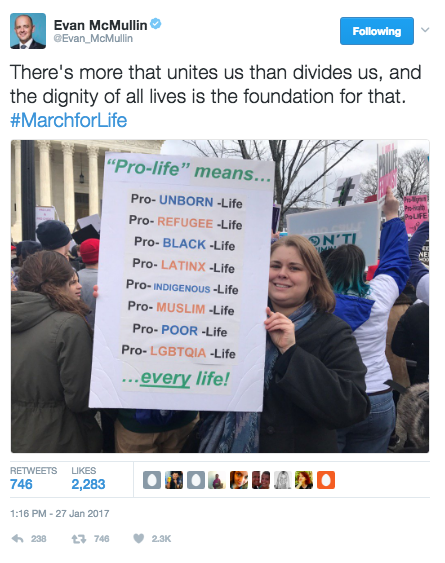This Pro-Life Sign Highlights an Important Aspect of the Abortion Debate

By:
A sign photographed at Friday's March for Life has stirred a debate about the possibility of a more inclusive pro-life movement.
 Twitter/Evan McMullin - twitter.com
Twitter/Evan McMullin - twitter.com
The image was shared on Twitter by former independent conservative presidential candidate Evan McMullin. The tweet does not identify of the woman pictured, so the details of her political views remain unclear.
That said, the sign poses a vision of the pro-life movement that would value the lives of marginalized people in addition to those of unborn fetuses.
This sentiment was echoed in a Wednesday Chicago Tribune opinion piece penned by John Gehrig, Catholic program director at advocacy group Faith in Public Life, who quoted the late Cardinal Joseph Bernardin:
"Those of us who defend the right to life of the weakest among us must be equally visible in support of the quality of life of the powerless among us: the old and the young, the hungry and the homeless, the undocumented immigrant and the unemployed worker."
Whether or not you oppose a woman's right to choose to have an abortion, it is certainly better to value Black, Muslim, poor, immigrant, and LGBT people's lives than not to value them. Some social media users suggested the sign sent a positive message but was not representative of the march and pro life movement at large.
However, the sign fails to acknowledge that access to reproductive health care is fundamentally intertwined with poverty and race.
Denying women the right to choose to terminate their pregnancies does not impact everyone equally. Many American women seek abortions because they cannot afford to raise children, and welfare programs do not provide enough of a safety net. In a 2004 Guttmacher Institute survey of 1,209 abortion patients, 73 percent of women said they could not afford a baby.
Low-income women are also more likely to face obstacles obtaining abortions and experience poverty as a result.
A 2014 study from Advancing New Standards in Reproductive Health, a research group based out of the University of California, San Francisco, tracked the long term impacts of taking an unplanned pregnancy to term. Low income women who wanted abortions and were unable to obtain them were three times more likely to experience poverty within two years, researcher Tracy Weitz told the Atlantic.
As non-white women are impacted by poverty at high rates, abortion access is cannot be uncoupled from racial inequality.
“Since 2010, there have been over 330 pieces of legislation implemented at the state-level regarding abortion restrictions,” National Latina Institute for Reproductive Health senior Director Ann Marie Benitez told Rewire Thursday.
“Sadly, where we see the strictest laws and the most barriers are the same states where we see large numbers of low-income women of color," Benitez said. "These are the people who bear the brunt of these restrictions—and that’s true across the board, no matter where in the country."
In a post-election interview on Public Radio International, feminist activist and author Gloria Steinem argued reproductive rights cannot be isolated from systemic racism and class.
"The way that we begin hierarchy is controlling reproduction, and that means controlling the bodies of women," she said. "And of course, if there is a strong racist system, or a caste system as in India, then it becomes even more vital to control reproduction because that's the only way you can maintain the separation of groups that racism or caste system or class system requires."
